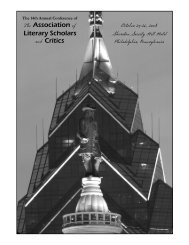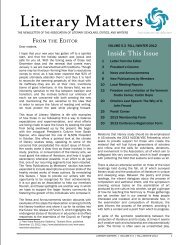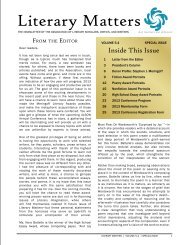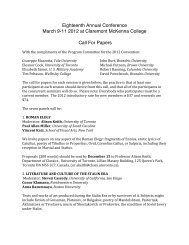Literary Matters - Association of Literary Scholars, Critics, and Writers
Literary Matters - Association of Literary Scholars, Critics, and Writers
Literary Matters - Association of Literary Scholars, Critics, and Writers
Create successful ePaper yourself
Turn your PDF publications into a flip-book with our unique Google optimized e-Paper software.
when a rattlesnake bites Jim, Huck relies on superstitionto explain the bad fortune even though he knows thatit happened because he left the carcass <strong>of</strong> the snake’smate on Jim’s bed. As he puts it, “that all comes <strong>of</strong> mybeing such a fool as to not remember that wherever youleave a dead snake its mate always comes there <strong>and</strong> curlsaround it” (40). Yet only a paragraph later, he returns tomagical thinking, saying “I made up my mind I wouldn’tever take aholt <strong>of</strong> a snake-skin again with my h<strong>and</strong>s, nowthat I see what had come <strong>of</strong> it” (40).Just as they use superstitions to make sense <strong>of</strong>a natural world they find difficult to comprehend, thecharacters in Huck Finn turn to magic to justify inexplicable<strong>and</strong> unfortunate occurrences. The gruesome death <strong>of</strong>Hank Bunker, a St. Petersburg townsperson, is one suchevent that is explained away through superstition. Whilediscussing looking at the moon over your left shoulder,which Huck declares “one <strong>of</strong> the carelessest <strong>and</strong>foolishest things a body can do,” he mentions that “OldHank Bunker done it once ... <strong>and</strong> in less than two years hegot drunk <strong>and</strong> fell <strong>of</strong>f <strong>of</strong> the shot tower <strong>and</strong> spread himselfout so that he was just a kind <strong>of</strong> a layer ... but anyway, itall come <strong>of</strong> looking at the moon that way” (40). Similarly,Huck blames Pap’s undesirable return on his own spillingsalt at the breakfast table. After the accident, he says“the widow put in a good word for me, but that warn’tgoing to keep <strong>of</strong>f the bad luck, I knowed that well enough”(12). And, lo <strong>and</strong> behold, within a paragraph, Huck hasdiscovered his father’s distinctive boot prints in the snow.This pattern <strong>of</strong> superstitious justification occurs mostprominently in the repeated references to the snakeskin.Throughout the story, Huck <strong>and</strong> Jim continually return tothe bad luck associated with h<strong>and</strong>ling a snake’s shedskin to explain their consistent misfortune, which is,more probably, an authorial device used to keep the plotfrom growing stagnant. For example, when the raft slipspast Cairo <strong>and</strong> the fork to the Ohio River, Jim bemoans,“I awluz ‘spected dat rattle-snake skin warn’t done widit’s work” (70). Within the next page, Huck <strong>and</strong> Jim blameboth the disappearance <strong>of</strong> their canoe <strong>and</strong> their collisionwith the steamship on the snake-skin. Such attribution <strong>of</strong>misfortune to forces beyond one’s control is a tempting<strong>and</strong> natural human tendency, <strong>and</strong> it st<strong>and</strong>s to reason thatHuck <strong>and</strong> Jim, living, as they do, in a violent world beyondthe conventional social sphere, should especially cling tothese superstitious explanations.The rich <strong>and</strong> varied examples <strong>of</strong> superstition withinThe Adventures <strong>of</strong> Huckleberry Finn, which come fromwhite <strong>and</strong> black, young <strong>and</strong> old, provide Twain withstrong satirical material <strong>and</strong> allow him to paint a moredetailed anthropological picture <strong>of</strong> life in the antebellumMississippi Valley. However, they also enable him toexplore deep, universal themes through a unique <strong>and</strong><strong>of</strong>ten comic lens that fits nicely with the folksy aesthetic <strong>of</strong>the novel. Racial commonality; race relations; irreverencein regards to religion; man’s attempts to comprehend thenatural world; <strong>and</strong> man’s desire to explain why bad thingshappen are all explored through the superstitious bent <strong>of</strong>Huckleberry Finn’s world. Far from being a marginal motifadded in for flair, superstition is central to the thematicdevelopment <strong>of</strong> The Adventures <strong>of</strong> Huckleberry Finn. aWorks Cited:Twain, Mark. The Adventures <strong>of</strong> Huckleberry Finn. NewYork, N.Y.: Bantam Dell, 2003.Renewal Letter from Incoming President Greg DelantyWe have over 600 members now. I’d love if we reached 800 members before the end <strong>of</strong> mypresidency, <strong>and</strong> 1000 by the end <strong>of</strong> my past President year. I am also asking you to bring in at leastone new member, if not two. I promise to give a gift membership myself to five new people <strong>and</strong> tobring in another five. So, by the end <strong>of</strong> January I’ll tell you how I did. I wonder could you give one giftmembership, which is only $37, <strong>and</strong> also bring in someone else, <strong>and</strong> tell them what good value theyare getting for just $37.a So please renew your own membership for 2011, at whatever category you feel able to do so.a And please endeavor to bring at least one new member into the <strong>Association</strong>--more if you can.a https://www.bu.edu/literary/membership/join-or-renew.shtmlFor now, my thanks <strong>and</strong> hopes, <strong>and</strong> happy new year.LITERARY MATTERS | VOLUME 3.4 | YEAR-END 2010 22







